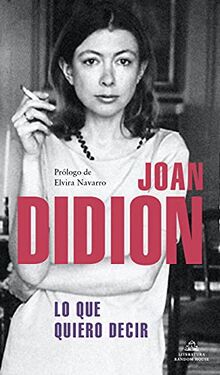
Una colección atemporalde algunos delos primeros artículos y crónicasde la icónica escritora y periodista norteamericana.
'Una excelente introducción a la aguda mirada deDidion sobre la vida estadounidense.'Bethanne Patrick, The Washington Post
'Escribo estrictamente para averiguar qué estoy pensando, qué estoy mirando, qué veo y qué significa.'
Lo que quiero decir recopila doce artículos y crónicas inéditas en español de Didion bajo el eje vertebrador de lo que el Nuevo Periodismo llamó #el narrador testigo#. Redactados en la primera parte de su carrera como periodista, estos concisos e incisivos textos muestran los intereses primarios que la convirtieron en escritora y abarcan un amplio espectro de sus temas habituales, desde el acto de escribir a la crónica social o política. Por sus páginas desfilan personajes como Orwell, Hemingway, Mapplethorpe, Nancy Reagan, anónimos de Ludópatas Anónimos o el propio director de admisiones de la Universidad de Standford, donde fue rechazada.
Didion es uno de los iconos culturales de Estados Unidos y una de las figuras clave del periodismo de las últimas cinco décadas, y en sus crónicas, como apunta el prólogo de Elvira Navarro, #refleja, como pocos autores, un mundo, el estadounidense, que, para bien y para mal, ha extendido sus tentáculos por todo el orbe, hasta el punto de que hoy resulta imposible comprender la cultura y los acontecimientos políticos y económicos más recientes de los países occidentales (España entre ellos) sin mirar a Estados Unidos. Leerla es también, por consiguiente, adentrarnos en lo que nos ha sucedido a todos en las últimas décadas'.
La crítica ha dicho...
'Didion es una cronista de nuestro mundo, una escritora que disuelve delirios compartidos para presentar la cruda realidad con estilo [...]. [Esta recopilación] destaca momentos en la progresión de Didion como creadora de palabras y reportera de hitos culturales.' Time
'Esta amplia colección de artículos de Joan Didion muestra sus fortalezas como escritora de piezas breves [#]. Como siempre, su escritura es cautivadora [#]. Los fanáticos de Didion, nuevos y viejos, estarán encantados.' Publishers Weekly
'Una excelente introducción a la aguda mirada de Didion sobre la vida estadounidense.' Bethanne Patrick, The Washington Post
'Estos notables artículos de sus inicios como escritora destacan por su búsqueda de la verdad y la atención al detalle.' Peter Conrad, The Guardian
'Una oportunidad [...] para ver de nuevo a la escritora que precedió al icono, la que estuvo al margen de la cultura, mirando hacia dentro.' Jessica Ferri, Los Angeles Times
'Un acto de seducción consumado [#]. Una colección elegante y muy satisfactoria.' Kirkus
'Ha sido canonizada por su impecable estilo, pero las verdaderas ideas de Didion se centraron en aquello que mantiene unida a la sociedad o la desgarra.' Nathan Heller, The NewYorker